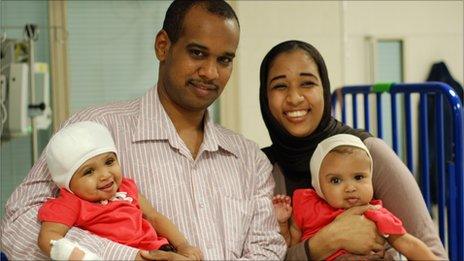"It's a great gift" say parents of separated twins
- Published
- comments

Proud parents holding Rital on left and Ritag on right
Meeting twins Rital and Ritag Gaboura it was astonishing to think that just a month ago they were unable to look each other in the eyes.
After four complex operations they have been successfully separated with no apparent signs of any neurological damage from the procedure.
Their parents - both doctors from Sudan - found out during a scan six months into the pregnancy that the babies were conjoined.
Each cradling a daughter in their arms, they told me about the incredible journey the family have undertaken.
"I was preparing to live with conjoined twins my whole life but we are so lucky to have two separate healthy girls; It's a great gift," said their father Dr Abdelmageed Gaboura, who is a registrar obstetrician in Khartoum.
The twins' mother Dr Enas Gaboura, is still undergoing medical training, but planning some time off once the family return home, hopefully within a few weeks.
She says it is wonderful for the twins to be able to get to know each other.
"Before the surgery they used to hold hands and play with each other's hair. After the operation it took them some time to realise what had happened, but now they have started to share their toys."
Traditionally, craniopagus or head-to-head twins have been separated in a single, big and long operation, for which the risks of brain damage and death are high. The team at Great Ormond Street Hospital in London opted for a staged approach which allowed the twins time to recover.
The first two operations involved separating the brain and its blood supply.
The third operation involved using tissue expanders to stretch and grow new skin. Then finally the separation itself.
In all the twins were in surgery for nearly 40 hours.
The lead surgeon David Dunaway said there was no indication that the twins had suffered any neurological damage as a result of the separation.
"It's been a joy for us all to see them separated and to have such a good outcome. The girls will need some further reconstructive surgery in the future to get their skulls shaped properly. But I would expect them lead a normal life just like anyone else."
Ethical?
Those involved in the treatment of the twins are keen to stress that the NHS did not pay for any of the care. The surgical team donated their time and the charity Facing the World, external paid for other costs including the travel and medical care.
The costs were considerable - one estimate mentioned to me was in the region of £400,000.
Given that Sudan is an extremely poor country with one of the world's highest infant mortality rates, those involved in this surgery were asked whether it was morally right to devote so much money to the twins, when so many others needed help.
Simon Eccles, a surgeon at Chelsea and Westminster Hospital and Secretary of Facing the World said: "We do consider such things very carefully, but this was an occasion where we knew that this was the only option to treat the twins. Part of the spin-off of our work is to teach doctors abroad and to build local expertise. So the benefits extend far beyond one family."
Rital and Ritag will be one on Thursday. The parents say they will have two important anniversaries each year - the day of their birth and that of their separation.